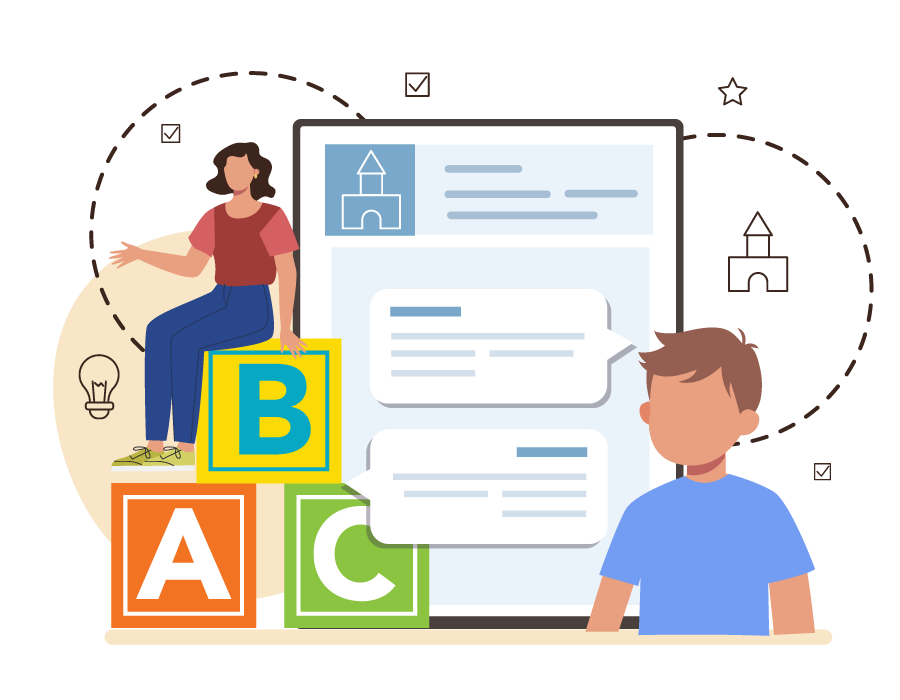Powered by Amee Cohen & Associates | +1 (954) 869-7202 | kshield@acandassociates.com
Powered by Amee Cohen & Associates | +1 (954) 869-7202 | kshield@acandassociates.com

When an area assessed in the screening needs strengthening, the Educator Instruction Plan of Action begins supporting students in general education with interventions that increase in intensity as the child progresses.
EIPA can significantly streamline the Intervention process for private schools empowering educators with evidence-based instruction plans, data collection and progress monitoring while providing parents with comprehensive information about their child’s progress, instruction, and interventions used.
$39.90/ week for 12 weeks

The target areas are as follows: Concepts of Print, Phonological/Phonemic Awareness, Phonics, Fluency, Reading Comprehension and Reading Vocabulary.
The importance of reading to children cannot be underestimated. Reading benefits a child’s education, social and cognitive development, well-being, and mental health. Learning to read in the early elementary years is critical to your child’s memory and success in later grades. Literacy is the cornerstone of development.
Many children who have trouble reading skip words as they read, preferring to read the words they recognize first and fill in the unfamiliar words later.
Children may struggle with reading for a variety of reasons, including lack of experience with books, speech and hearing problems, and poor phonemic awareness, to name a few.
Our special educators can identify the area of concern(s) in reading and create an action plan for educational intervention that targets the deficits in reading that need strengthening. The special educator and parent/caregiver will oversee the intervention through careful progress measurement/data collection and decide if further intervention is needed.
EIPA includes customized reading programs:

Concepts of Print refers to an awareness of “how print works.” This includes understanding the concept of what books, print, and written language are and how they work. It includes several insights that make the reading process possible. An intervention program can assist with learning how print conveys a message, learning how books and print are oriented, distinguishing between sentences, words, and letters, and understanding the alphabetic system.

Phonological awareness is the ability to recognize and manipulate sounds in words. Children with phonological awareness can identify and form oral rhymes, clap out the number of syllables in a word, and recognize words with the same initial sounds. A customized intervention program can assist children develop phonological and phonemic awareness through several activities.
 Phonemic awareness is the ability to hear and process individual sounds in spoken words. Developing phonemic awareness is crucial to spelling and word recognition. Students at risk for reading difficulties often have lower levels of phonological and phonemic awareness than their peers. A customized intervention program can assist children develop phonological and phonemic awareness through several activities.
Phonemic awareness is the ability to hear and process individual sounds in spoken words. Developing phonemic awareness is crucial to spelling and word recognition. Students at risk for reading difficulties often have lower levels of phonological and phonemic awareness than their peers. A customized intervention program can assist children develop phonological and phonemic awareness through several activities.
 Reading fluency is defined as the ability to read with speed, accuracy, and proper expression. In order to comprehend what is read, students must be able to read fluently, whether reading aloud or silently. A tailored reading fluency intervention program can help improve reading fluency. Evidence-based activities, done reliably, have been shown to help children recognize words at first glance and help students who sound choppy when reading due to difficulty decoding or lack of practice. Reading fluency is also important for motivation; children who find reading difficult generally do not want to read.
Reading fluency is defined as the ability to read with speed, accuracy, and proper expression. In order to comprehend what is read, students must be able to read fluently, whether reading aloud or silently. A tailored reading fluency intervention program can help improve reading fluency. Evidence-based activities, done reliably, have been shown to help children recognize words at first glance and help students who sound choppy when reading due to difficulty decoding or lack of practice. Reading fluency is also important for motivation; children who find reading difficult generally do not want to read.

Vocabulary refers to the words a student knows, understands, and uses to communicate effectively. In school, it may be referred to as oral vocabulary or reading vocabulary. A tailored reading vocabulary program can help students develop strategies to determine the meaning of unfamiliar words, use context clues, and make connections to comprehend texts.

Reading comprehension is the ability to read a text, process it, and understand its meaning. A customized reading comprehension intervention program provides activities that help struggling readers develop their comprehension skills. Reading research has shown that reading comprehension can help students understand and remember what they read, communicate with others orally and in writing, and draw on prior knowledge and experience to make inferences.
Contacts
By Appointment only:
1825 NW Corporate Blvd
Suite 110, Boca Raton, FL
33431-8554
200 E Robinson St.
Suite 1120, Orlando, FL
32801-1962
+1 (954) 869-7202
kshield@acandassociates.com
For Mailing Only:
1825 NW Corporate Blvd
Suite 110, Boca Raton, FL
33431-8554
Registration Center
BCBA Application Form
ESE Specialist Application Form
Therapist Application Form
KShield Partnership Program
RtI Private School Partnership
Associated Referral Rewards Program
New Patient Registration Form
New Patient Referral Form
School Registration Form
Clinic, Hospital, Financial Form
Work with us Form
Our Associations
AC&A ESE Specialists and Pediatric Therapists are licensed professionals and follow the best practices and standards approved by their professional associations.
Clinical Management
This site content is under the responsibility of Amee Cohen & Associates. Secure Video Library and Video Consultation HIPAA compliant.